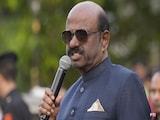New Delhi:
Despite losing most of his sponsors in the wake of his sexcapades, Tiger Woods has been ranked by Forbes as the biggest brand in the world of sports. Forbes estimated in its second annual 'Fab 40' list that Woods remains the top sports brand with an estimated value of $82 million.
His total was larger than that of the next five athletes combined, according to Forbes. Soccer star David Beckham ($20 million), tennis player Roger Federer ($16 million), NASCAR driver Dale Earnhardt Jr. ($14 million) and National Basketball Association stars LeBron James and Kobe Bryant ($13 million and $12 million, respectively) rounded out the top six.
Tiger has of course been the richest athelte in the world for about a decade now, and is infact the first athlete to be worth a billion dollars. But sexcapades will cost him from next year onwards as after he announced his indefinite break from golf following the revelation of his affairs with 19 women, most of his sponsors distanced from him.
While Nike and others have stood by Woods, Accenture Plc and AT&T Inc dropped him as their pitch man after he became engulfed in allegations of multiple extramarital affairs following a minor car accident outside his Florida home on November 27.
The most valuable team brand is English soccer club Manchester United, worth an estimated $270 million, just ahead of Major League Baseball's New York Yankees at $266 million, Forbes said.
Among sporting events, the National Football League's Super Bowl championship game was the leader with an estimated value of $420 million, topping the Summer Olympic Games ($230 million) and the FIFA World Cup ($120 million), the magazine said.
In the business category, Nike at $10.7 billion was the top brand, outpacing Walt Disney Co's ESPN brand ($10.5 billion), Forbes said. Rounding out the top five were Adidas AG, PepsiCo Inc's Gatorade, and Adidas brand Reebok.
Forbes said it ranked athletes based on endorsement income relative to peers in their sport; businesses based on the amount of an enterprise's private market value attributable to its name; teams based on the portion of their overall value not a result of market demographics and league; and events based on revenue generated per day of competition.
His total was larger than that of the next five athletes combined, according to Forbes. Soccer star David Beckham ($20 million), tennis player Roger Federer ($16 million), NASCAR driver Dale Earnhardt Jr. ($14 million) and National Basketball Association stars LeBron James and Kobe Bryant ($13 million and $12 million, respectively) rounded out the top six.
Tiger has of course been the richest athelte in the world for about a decade now, and is infact the first athlete to be worth a billion dollars. But sexcapades will cost him from next year onwards as after he announced his indefinite break from golf following the revelation of his affairs with 19 women, most of his sponsors distanced from him.
While Nike and others have stood by Woods, Accenture Plc and AT&T Inc dropped him as their pitch man after he became engulfed in allegations of multiple extramarital affairs following a minor car accident outside his Florida home on November 27.
The most valuable team brand is English soccer club Manchester United, worth an estimated $270 million, just ahead of Major League Baseball's New York Yankees at $266 million, Forbes said.
Among sporting events, the National Football League's Super Bowl championship game was the leader with an estimated value of $420 million, topping the Summer Olympic Games ($230 million) and the FIFA World Cup ($120 million), the magazine said.
In the business category, Nike at $10.7 billion was the top brand, outpacing Walt Disney Co's ESPN brand ($10.5 billion), Forbes said. Rounding out the top five were Adidas AG, PepsiCo Inc's Gatorade, and Adidas brand Reebok.
Forbes said it ranked athletes based on endorsement income relative to peers in their sport; businesses based on the amount of an enterprise's private market value attributable to its name; teams based on the portion of their overall value not a result of market demographics and league; and events based on revenue generated per day of competition.















